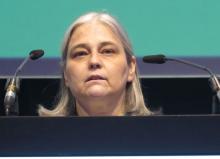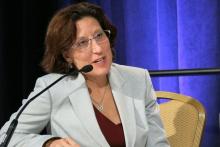MUNICH – The combination of the cyclin-dependent kinase 4/6 inhibitor palbociclib (Ibrance) and fulvestrant (Faslodex) was associated with longer overall survival of women with hormone receptor–positive, human epidermal growth factor receptor 2 (HER2)–negative advanced breast cancer in the PALOMA-3 trial.
But the benefit seemed to be almost entirely limited to women with sensitivity to previous endocrine therapy; differences in overall survival among the entire cohort were not statistically significant, reported Massimo Cristofanilli, MD, of Northwestern University in Chicago, and his colleagues.
“These findings confirm that the use of palbociclib plus fulvestrant is a standard for care in patients with previously treated hormone receptor–positive, HER2-negative advanced breast cancer, he said in a briefing held prior to his presentation of the data at the European Society for Medical Oncology Congress.
The results were published simultaneously online in the New England Journal of Medicine.
Briefing discussant Nadia Harbeck, MD, is a breast cancer specialist with the University of Munich Medical Center, who is a coinvestigator of PALOMA-3, noted that there are currently three marketed cyclin-dependent kinase (CDK) 4/6 inhibitors and that all three have been shown to be associated with prolonged progression-free survival (PFS).
Yet, “there’s still a lot of uncertainty out there in the community whether to give these drugs, when to give these drugs, and also from the payers’ perspective, because there’s no overall survival, and I think this is now going to change,” she said.
“Ten months overall survival benefit in a CDK 4/6 inhibitor study in the second-line setting I think is unprecedented, and I think will change people’s hearts who weren’t quite sure, and I think we can now confidently say to our patients that this is the drug to take,” she added.
Dr. Cristofanilli discussed results of a prespecified analysis of overall survival from the previously reported trial.
Investigators enrolled 521 patients with HR-positive, HER2-negative advanced breast cancer who had progression or relapse during previous endocrine therapy, and randomly assigned them to fulvestrant plus palbociclib or placebo.
In addition to looking at overall survival, the analysis included evaluation of the effects of palbociclib in women both with and without sensitivity to endocrine therapy, the presence or absence of visceral metastatic disease, and menopausal status. In addition, the analysis looked at the efficacy of therapies after disease progression, and safety of the respective regimens.
The median overall survival at a median follow-up of 44.8 months was 34.9 months with palbociclib/fulvestrant vs. 28 months for placebo/fulvestrant, translating into a stratified hazard ratio (HR) for death in the palbociclib arm of 0.81, but this difference was not statistically significant (P = .09). The unstratified HR was 0.79 (P = .05; the prespecified significance threshold was a two-sided P value of .047).
When they looked at the 410 patients with documented sensitivity to previous endocrine therapy, however, the investigators found a median OS of 39.7 months with palbociclib vs. 29.7 months with placebo. The HR for death with palbociclib in this subgroup was 0.72, with a 95% confidence interval indicating statistical significance.
In contrast, among 111 patients with documented intrinsic endocrine resistance, the median OS with palbociclib was actually lower than in the placebo group, albeit not significantly, at 20.2 vs. 26.2 months, respectively (HR, 1.14; P = .012 for interaction).
The median time to starting chemotherapy was 17.6 months in the palbociclib/fulvestrant group vs. 8.8 months in the placebo/fulvestrant group (HR, 0.58; P less than .001).
The safety profile of the combination was similar to that seen in the primary analysis of PALOMA-3. Grade 3 or 4 neutropenia occurred in 70% of patients on palbociclib vs. none of the patients on placebo. Other grade 3 or 4 events included anemia in 4% vs. 2%, thrombocytopenia in 3% vs. none, and febrile neutropenia in 1% vs. none.
Other grade 3 or greater events occurring with palbociclib in more than 2% of patients were infections, fatigue, and elevated aspartate aminotransferase levels.
Invited discussant Fatima Cardoso, MD, director of the breast unit of the Champalimaud Clinical Center in Lisbon, commented that PALOMA-3 was adequately powered for the primary endpoint of PFS, but not for a secondary overall survival endpoint.
She also raised questions that still need to be answered about the use of CDK 4/6 inhibitors with endocrine therapy in this population, including how to better identify which patients might benefit from the combination, whether the combination should be used in the first line or in subsequent lines of therapy, and whether it should be used in patients with or without prior endocrine therapy exposure.
Another unanswered question is whether disease progression accelerates after CDK 4/6 inhibitors are stopped.
“We need to confirm if this problem of post progression is true or not, and there may be a rationale to explore continuing beyond progression. This was a paradigm that changed in the HER2-positive population, and we now know that we need to continue to block the HER2 pathway, because if we don’t, the progression is faster. Will that apply here as well?,” she asked.
Hope S. Rugo, MD, a clinical professor of medicine and director of the Breast Oncology Clinical Trials Program at the University of California, San Francisco, Helen Diller Family Comprehensive Cancer Center, commented that patients in PALOMA-3 were allowed to have had chemotherapy, and there is evidence to suggest that prior chemotherapy is a risk factor for resistance to other therapies as well.
“So looking at patients with hormone-sensitive disease who have done their chemotherapy, seeing a survival benefit in any subset of patients with hormone receptor–positive disease getting a targeted agent is already pretty exciting,” she said in an interview.
Dr. Rugo was not involved in PALOMA-3.
PALOMA-3 was supported by Pfizer. Dr. Cristofanilli disclosed personal fees from Pfizer, Novartis, and Merus. Dr. Harbeck disclosed honoraria for consulting and lecturing for Pfizer and others. Dr. Cardoso has disclosed consulting fees and institutional support from Pfizer and others. Dr. Rugo has received fees/honoraria and other support for activities for Pfizer and others.
SOURCE: Turner NC et al. N Engl J Med. 2018 Oct 20. doi: 10.1056/NEJMoa1810527.





